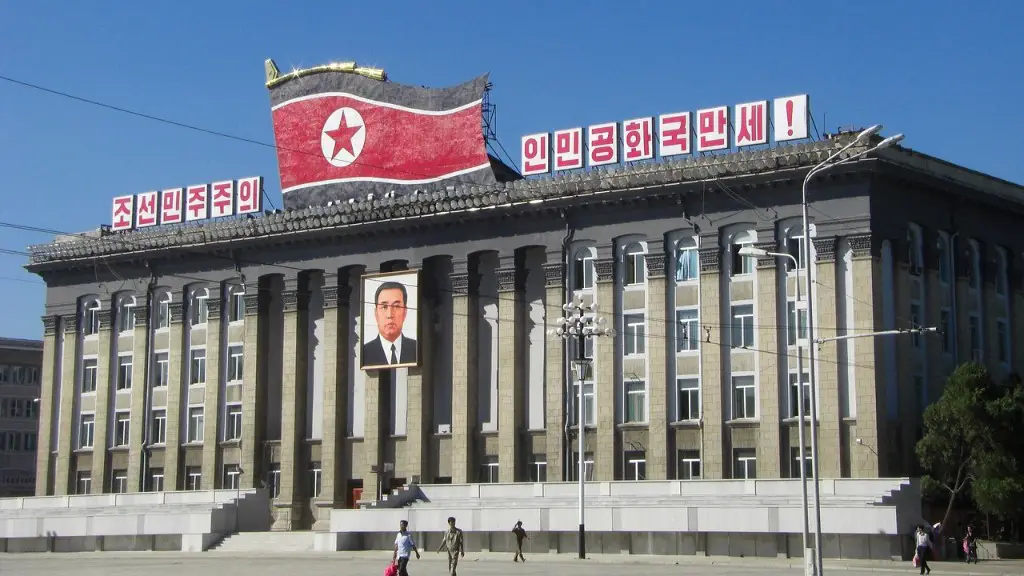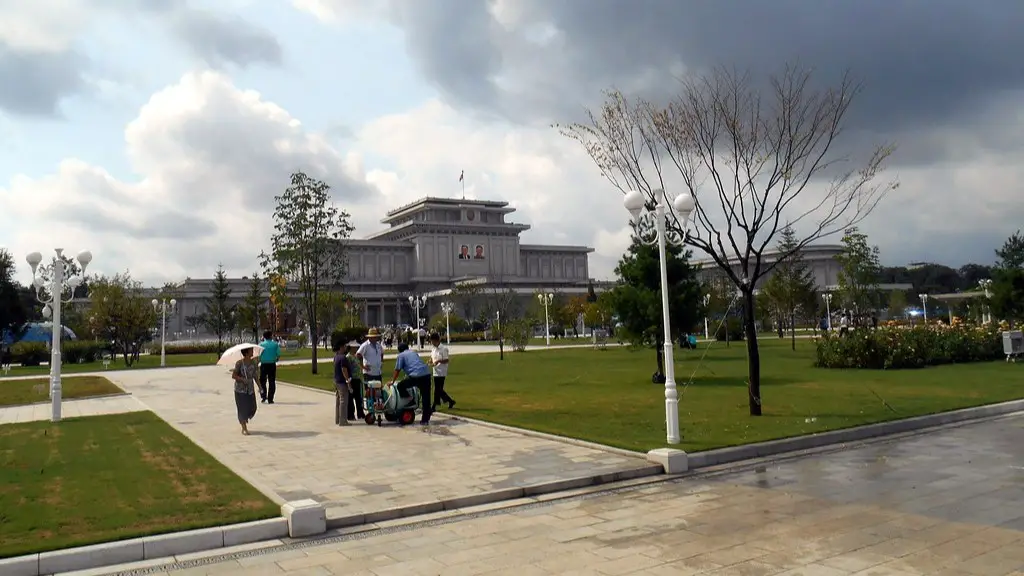Background Information
North Korea has been a hotbed of tension and conflict between nations for the past several years due to its nuclear weapons program and volatile foreign policy. As a result, a number of nations have imposed economic sanctions on North Korea in an effort to limit its actions and put pressure on its government. These sanctions have had a major impact on the country and have drawn large-scale criticism from numerous governments and human rights organizations.
The primary parties that have implemented sanctions on North Korea are the United States, the United Nations, and the European Union. Their respective sanctions have targeted the country’s coal exports and banking transactions as a means of forcing North Korea to abide by UN Security Council resolutions. China and Russia have also imposed certain restrictions on North Korea, such as a ban on North Korean textiles and labor imports, as well as limiting North Korea from shipping certain materials and products.
Relevant Data
The history of sanctions against North Korea traces back to 2006 after the country conducted its first nuclear missile test. Since then, the UN Security Council has imposed a series of resolutions that restrict the country’s uranium enrichment and weapons of mass destruction programs. The primary countries enforcing these resolutions are the United States and its powerful allies, as well as China and Russia.
These economic sanctions have had a significant effect on the North Korean economy. For instance, the US has imposed restrictions on all trade with North Korea, including the import of coal and other natural resources, as well as the export of oil and refined petroleum products. Furthermore, several US measures have restricted banking transactions between North Korea and other countries, resulting in a decrease in North Korea’s foreign currency reserves.
Experts Perspectives
Experts from various fields have weighed in on the effectiveness of sanctions against North Korea. Some argue that the sanctions have had a positive effect on the country, as it has begun to comply with UN directives and efforts to enter nuclear negotiations. Others argue that the sanctions have only pushed North Korea further into isolation and made the situation worse.
One of the most outspoken critics of sanctions against North Korea is Lawrence Wilkerson, a retired U.S. Army Colonel and former chief of staff to then-Secretary of State Colin Powell. According to Wilkerson, the US imposed sanctions are sending unintended and damaging messages to North Koreans, and punishing innocent people rather than targeting the real culprits. He maintains that instead of using economic sanctions, the US should focus on dialogue and negotiations with North Korea.
Insights and Analysis
It is difficult to accurately assess the effectiveness of economic sanctions on North Korea. While it is true that the sanctions have had an impact on the country’s economy, it is unclear if they have actually been successful in achieving the goal of persuading North Korea to back down from its nuclear program.
Furthermore, the sanctions have not yet been able to effectively weaken the North Korean regime, as evidenced by the fact that the country remains largely impervious to foreign pressure. Additionally, many of the sanctions are aimed at restricting the flow of goods and resources, but it is not working as intended due to the country’s long-standing relationship with China and Russia.
The long-term impact of sanctions is highly uncertain, as North Korea has the means and resources to withstand long-term pressure from foreign governments and international organizations. However, there is a chance that the sanctions may ultimately succeed in helping North Korea reach a peaceful solution from the international community.
Economic Development
Although sanctions have been imposed on North Korea in an effort to restrict its nuclear program, the economic development of the country has not been impeded by these measures. Despite trade restrictions and hard-hitting economic sanctions, North Korea has been able to sustain steady economic growth over the years.
This economic stability can be attributed to the fact that North Korea’s main trading partners, China and Russia, have been largely successful in circumventing US sanctions. Both countries have maintained strong ties with North Korea, thus allowing them to continue sending goods and services to the country. This has enabled North Korea to shift its investments and focus attention on areas such as agriculture, infrastructure and tourism.
Additionally, North Korea has benefited from its trading relationship with China as well as its investment in foreign countries such as Vietnam. The country has also received assistance from organizations such as the UN World Food Program and the Red Cross, which have provided essential humanitarian aid to the people.
Future Prospects
In the short term, it does not appear that the current sanctions on North Korea will be lifted anytime soon. The international community is still adamant about the need for North Korea to implement its commitments to nuclear non-proliferation and denuclearization.
In the long term, however, there is a chance that the country could be integrated into the international community over time. It is possible that economic sanctions could be gradually eased if North Korea decides to pursue a more cooperative approach towards international relations.
Furthermore, North Korea could gain a powerful diplomatic ally in the form of South Korea in the future if the two nations are able to resolve their differences. South Korea has advocated for sanctions relief for North Korea, claiming that it is necessary for reconciliation between the two countries. Additionally, South Korea could play an instrumental role in providing investment and aid to North Korea, which could help the nation recover from decades of isolation and conflict.
International Relationship
The relationship between North Korea and the international community has become increasingly strained over the past few years due to economic sanctions. The US, EU, UN, and other countries have placed various trade and financial restrictions on the country as a means of pressuring the North Korean leadership to denuclearize.
However, despite the intense sanctions regime, there have been some concrete diplomatic developments in recent times. For instance, North Korea has held a series of meetings with South Korea in an effort to defuse tensions between the two countries. Additionally, North Korea and the United States have agreed to begin direct negotiations in the hopes of achieving a comprehensive denuclearization agreement.
As of now, it is unclear if these diplomatic efforts will ultimately succeed in resolving the dispute between North Korea and the international community. However, it is possible that the two sides could reach a peaceful resolution if the sanctions are eased and North Korea agrees to abide by international law.
China’s Position
China has long been considered North Korea’s closest ally, and the Chinese government has been vocal in its defense of the North Korean regime. China is an ally of both the United States and North Korea and is one of the few countries that continues to engage with North Korea despite numerous economic sanctions imposed.
China has opposed and ignored US sanctions on North Korea and has also provided nuclear and missile technology to the country. At the same time, it has also been critical of North Korea’s nuclear weapons program, as well as its human rights abuses. As such, China is stuck in the middle of a highly contentious geopolitical stand-off and its actions could have a major impact on the situation.
China could play a key role in resolving the dispute over North Korea’s nuclear program and has maintained that it would support a denuclearization of the Korean peninsula. As a result, it is up to the Chinese government to decide whether it will continue to support the North Korean regime or pressure it to change course.
Consequences of Sanctions
The consequences of sanctions on North Korea can be seen in the country’s dire humanitarian situation. Since 2006, the United Nations has estimated that the sanctions measures have reduced the availability of food, fuel, and medical supplies to the people of North Korea. Additionally, the sanctions have caused a decrease in exports, leading to a loss of income for hundreds of thousands of workers.
Finally, the sanctions have caused a major disruption in the lives of North Koreans living abroad, especially in the US. This is due to the ban on US citizens travelling to North Korea, which has limited the ability of North Korean immigrants in the US to maintain contact with their families. This is of particular concern, as much of the North Korean diaspora in the US is made up of refugees fleeing the regime’s oppressive policies.


